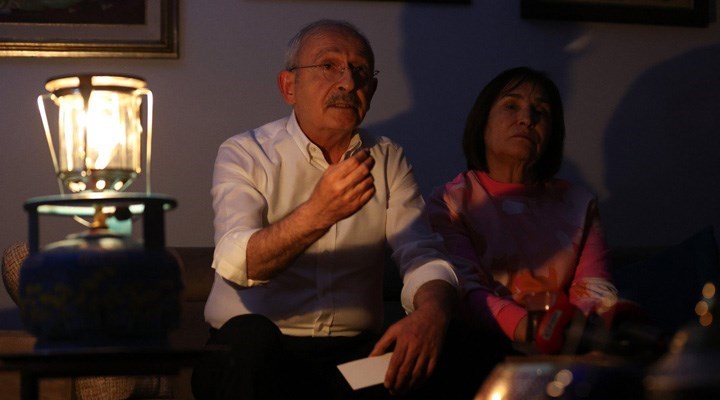Kemal Kılıçdaroğlu, the leader of Turkey’s main opposition Republican People’s Party (CHP), said on Thursday that he will “sit in the dark” for a week after power was cut at his home when he refused to pay his electricity bills in protest of steep hikes in energy prices.
Kılıçdaroğlu tweeted a video earlier on Thursday saying he had just been informed by his wife that the electricity in their apartment was cut off.
In a later video from his apartment illuminated by a gas lamp, the CHP leader appeared with his wife, Selvi, criticizing the ruling Justice and Development Party (AKP) government for depriving millions of people who can’t afford to pay their bills of electricity while filling the coffers of pro-government companies with lucrative tenders awarded to them.
“We will sit in the dark for one week. I walked kilometers for justice. In order to feel the suffering of my people, I will sit in the dark for one week. Do I have any hesitation? Never,” said Kılıçdaroğlu, as he referred to a “Justice March” he made from Ankara to İstanbul in 2017 in protest of the arrest of one of his party’s lawmakers.
According to a report drafted by CHP lawmaker and deputy chairman Ahmet Akın based on a number of questions he directed to the country’s Energy and Natural Resources Ministry, 3,449,000 customers of electricity distribution companies and around 1,093,000 subscribers of natural gas distribution companies had their electricity and natural gas supply disconnected in 2021 due to unpaid bills.
Speaking to Fox TV on Friday morning about his protest, Kılıçdaroğlu said some pro-AKP figures were offering to pay his bills but said he thinks they don’t understand what his goal is and are after “cheap heroism.”
“I can pay my electricity bill. It’s not much money for me. But there are millions of people who can’t pay their bills. They [the AKP] know nothing about them,” said Kılıçdaroğlu.
Turks started 2022 with news of jacked-up prices, fueled by a currency crisis amid the highest rate of inflation in nearly two decades.
Turkey’s Energy Market Regulatory Authority (EPDK) announced on Jan. 1 that it had raised electricity prices by 52 percent for lower-demand households for the new year and 127 percent for high-demand commercial users, while the Petroleum Pipeline Corporation (BOTAŞ) raised natural gas prices by 25 percent for households and 50 percent for industrial users.
Thousands of people across Turkey also have held demonstrations against the rising electricity prices they have faced since the beginning of the year.
In response to the widespread protests, President Recep Tayyip Erdoğan in early March announced a reduction of the sales tax on electricity used in residences and agricultural irrigation from 18 percent to 8 percent.

